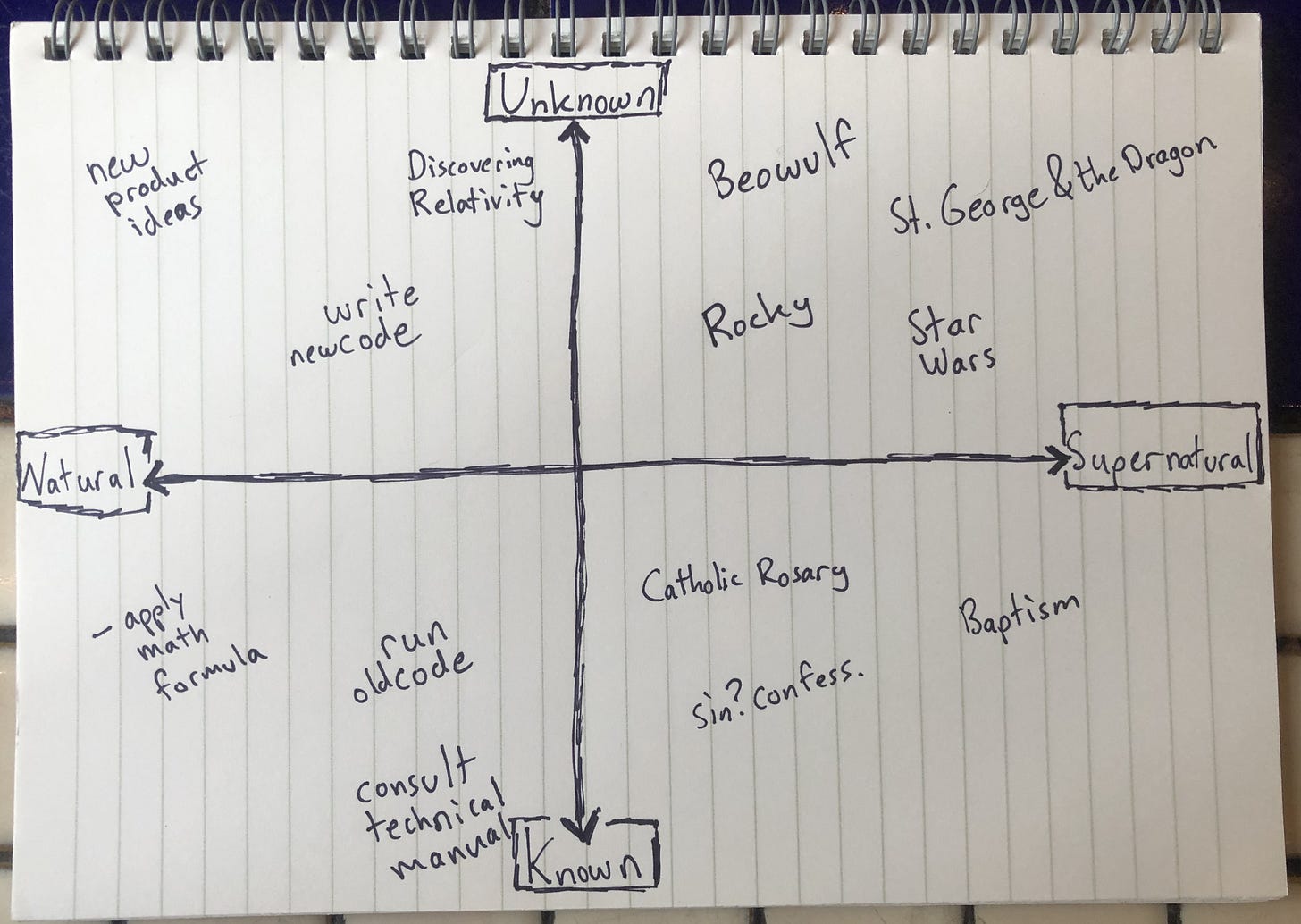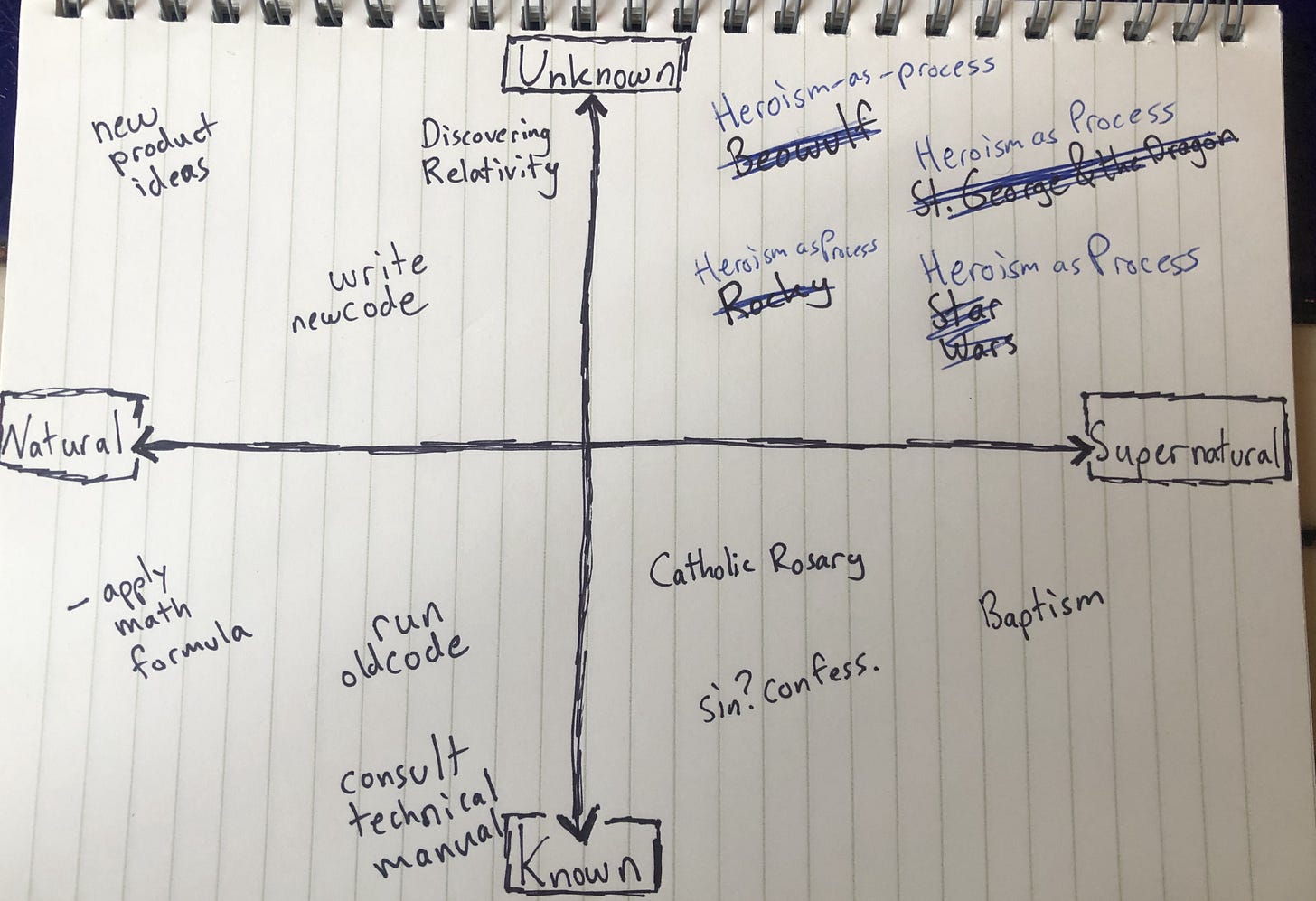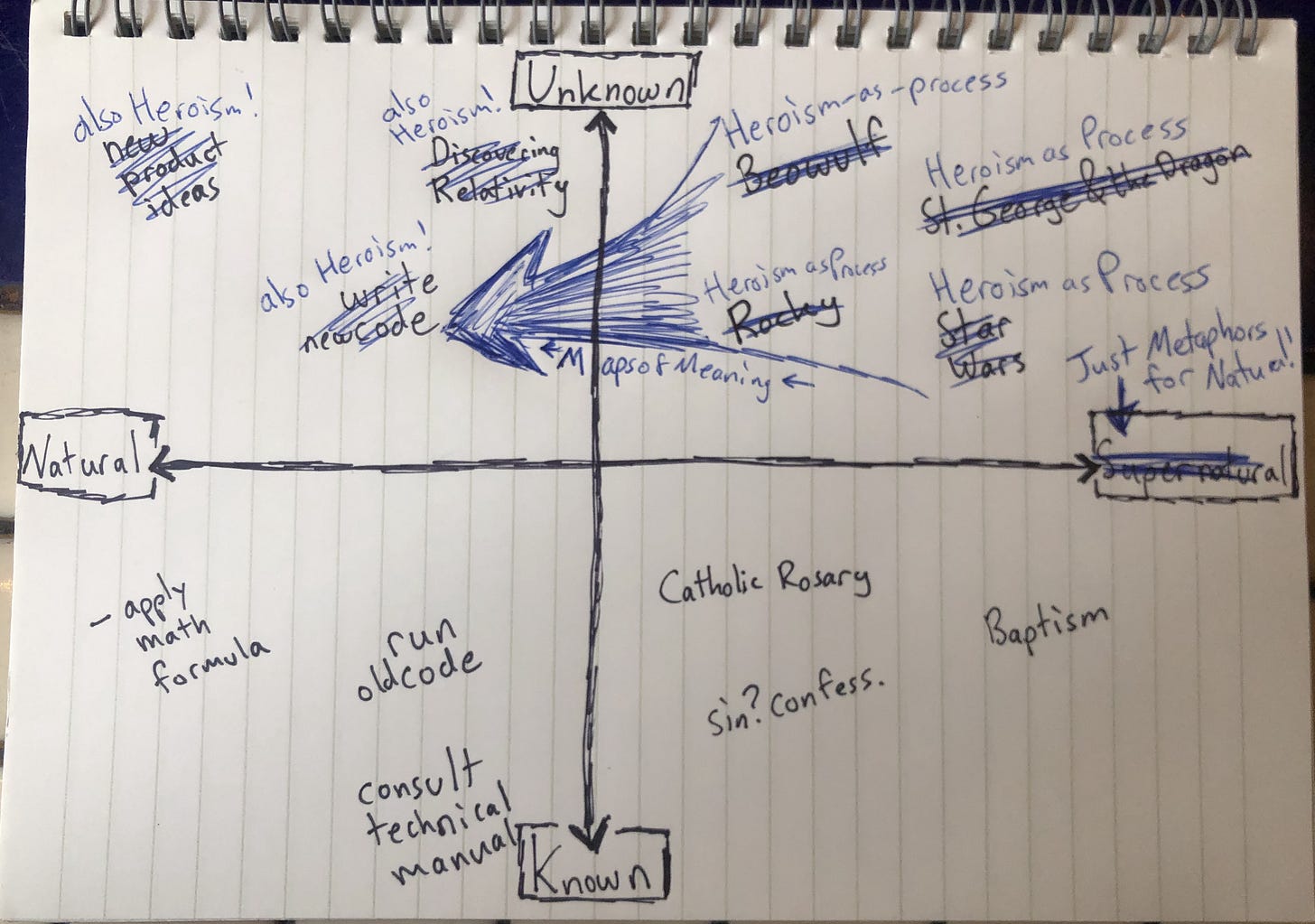Less Supernatural, More Unknown
epistemic status: A lot of these ideas are likely remixed from past great thinkers like Jung, Aquinas, etc. These ideas were a view-quake for me: I earned a lens with which to understand religious behavior from a purely non-spiritual standpoint. It has had practical implications for my life.
I’ve had this 2x2 floating around in my head for weeks, like a fever dream. I want to take on you on my adventure to get there.
I read Jordan Peterson’s Maps of Meaning over the summer. It’s dense, and long, and took him decades to write. It was very ambitious. I think it mostly succeeded, if you view it with the right frame.
What is “Maps of Meaning”?
The frame you must adopt to understand Maps of Meaning is that of narrative metaphor and archetype: Religious rituals and truths are not literal. Full stop. Folks who take them literally err, both believers and nonbelievers. Religious rituals and truths are enactments of archetypal, useful behavior. For example: when you pray to your ancestors you aren’t literally talking to dead people. You’re sandboxing archetypal personas selected (as in “natural selection”) by history as being useful, and asking their advice. Not literal ancestral kings, but the ideal of what a King might think.
Peterson performs an anthropological study of the abstract concepts of religion. And in so doing, gives a reasoned architecture upon which to understand the beneficial parts of religion, which requires no acceptance of the supernatural. No gods or angels actually required! Peterson, perhaps inadvertently, makes a materialist argument for why religion is not supernatural and is in fact, a set of shared ritualistic precepts, with which to live one’s life. In trying to steel-man religion’s techniques for confronting the supernatural and unknown, Peterson de-fangs the need of the supernatural at all. By giving us a frame to see religion and its tools as natural, Peterson takes thousands of years of wisdom in supernatural thinkers and unlocks it for the non-religious and the non-spiritual.
It is difficult to overstate how important and useful this is.
I don’t know if this is what Peterson intended.
What is “Good”?
With this frame, Peterson does a wonderful job of Steel-Manning religion: That humanity has been ritualistically enacting, if sometimes blindly, Good as a meta process of confronting the unknown, perhaps getting harmed by it, and bringing back what you learned.
It’s a greater-good meta-process: Confront the unknown, and make something of it. This is the Hero’s Journey of St George and the Dragon, Beowulf, and so many more. It’s not a new idea. But the myth and ritual is explained without an appeal to the supernatural.
There’s an interesting explorable explainable of Maps of Meaning here.
What is Evil?
Peterson defines Evil as the rejection of this Good-as-meta-process. He calls this “rationality”. He defines rationality as denying the unknown. He defines rationality as “I know all that there is to know.” To be fair, he makes the case that the archetypal embodiment of this rationality, Satan the angel, is the highest angel. To use the frame Peterson uses in this book on religion, metaphorically, then rationality is the most powerful, highest tool in humanity. But the tool must be used for a higher purpose of Good: the meta-process of confronting the unknown and overcoming it.
I do not share Peterson’s definition of “rational”. But I do think he uncovers a conflict that underpins a lot of intellectual debates:
“scientism” vs. “science”
Where do great scientific hypothesis come from?
Can a rote following of scientific hypothesis testing lead to insight?
Why does industrializing the hard sciences not seem to produce more breakthroughs?
What’s the difference between performing a rote Catholic Rosary and a Catholic’s wrestling with a hard piece of scripture?
What does a rote Catholic Rosary and blind verification of p < 0.05 (statistical significance) have in common?
Supernatural vs Natural
I’ll use “supernatural” and “natural” to mean the split between material and dual. Fairies vs ferrous (iron).
Known vs Unknown
I’ll use “known” to mean things we’ve turned into stuff that we can do predictably. E.g. the knowledge that went into making a gear, and a wheel, baked into the machines that use them. Or a mathematical formula. How do you clean your teeth? How do you shave?
I’ll use “unknown” to mean things we don’t know how to solve yet. Can cold fusion work? What will happen 20 years after Brexit? Are we alone in the universe? How will you find love? How should you strengthen your relationship with your parents? How should you design a new product?
How should you confront the…

Let’s explore each quadrant:
Known and Natural
Things that exist in the material world, and we really know how to solve them.
Run existing software.
Apply a rote math formula.
Consult a technical manual for, e.g., which metal is strongest under torque.
Unknown and Natural
Things that exist in the material world, but you don’t know how to solve yet.
Write some new software.
Prove a new math theorem.
Design a new product for a novel problem
Known and Supernatural
The Catholics are great at these: religious technologies. These are the rote rituals and behaviors for confronting spiritual things with a prescribed behavior.
Rosary beads
Spinning Buddhist prayer wheels
Sin? Go to confession.
Unknown and Supernatural
How do you confront things that are unknown and supernatural? Heroism.
Luke Skywalker in the cave in Empire Strikes Back.
St George confronting the dragon.
Bilbo confronting Smaug
What did Maps of Meaning Set out to do?
Describe how confronting the Supernatural & Unknown is Heroism. And that it is Good.

What did Maps of Meaning Actually Do?
Moved the Supernatural+Unknown to the Natural+Unknown

So What?
Are you designing a new product? Handling a heartbreak? Writing new Code? You’re engaging in heroism. You are in the natural+unknown.
This can be scary. Because nobody’s been quite where you are, yet. But it can also be freeing! You can draw on the archetypes and narratives passed down through myth and religion. These myths are archetypal maps towards heroism and meaning. That feeling of going into the unknown, even if in the mundane?
Writ small or large, you follow in the mythical footsteps of the heroes that came before you: Know that you may be hurt in the process, but have courage. Be proud. Stand tall.
Postscript
The Supernatural/Unknown 2x2 has some interesting implications. We already know a lot of concepts for, e.g., you mistake something in one quadrant for another.
When science departments mistake hand-cranking statistical methods as a way of making breakthroughs, they mistake the Natural+Unknown for the Natural+Known
When a Catholic priest hears you speak of losing your faith and he tells you to just say 4 Hail Mary’s, he’s mistaking the Supernatural+Unknown for the Supernatural+Known.



